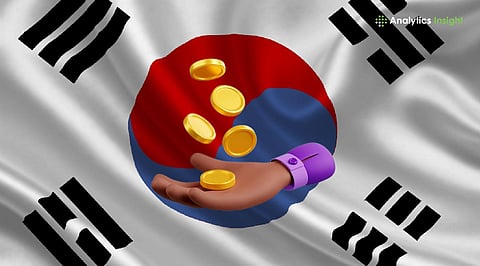

South Korea’s blockchain ecosystem is fast emerging as a leader in DeFi innovation across Asia.
Korean projects are combining fintech precision with strong regulation and user-friendly platforms.
These DeFi startups are setting new standards in scalability, transparency, and global crypto adoption.
South Korea has become one of Asia’s most active hubs for blockchain innovation, developing projects that challenge global players. The world of decentralized finance (DeFi) in Korea is driven by a technology enthusiast population, progressive developers, and increasing interest in institutions. Korean DeFi platforms balance between innovation and regulatory guidelines.
This combination boosts trust and scalability in trading, liquidity management, and decentralized governance. Some Korean startups are redefining how digital assets are managed across Asia.
Let’s take a look at DeFi Companies in Korea dominating the Asian blockchain market this year.
KLAYswap has automated liquidity pool services and fast transactions with minimal gas fees. It improves upon the Klaytn blockchain, which is one of Korea’s most trusted decentralized exchanges (DEX).
Its user-friendly interface has made DeFi access available to both beginners and experienced investors in Asia.
Also Read: Best DeFi Tools For Crypto Traders in 2025
DeFi faces a major challenge in the form of interoperability. Orbit Bridge solves this problem at ease. It connects multiple blockchains such as Ethereum, BNB Chain, Polygon, and Klaytn, which allow users to transfer assets without any issues.
Orbit Bridge focuses on security and scalability, which has made it a core infrastructure layer for the Korean DeFi environment.
Sienna Network integrates privacy protocols into DeFi environments. The platform has advanced zero-knowledge proofs, which secure private transactions while staying compliant.
The platform provides lending, borrowing, and yield farming tools for privacy services and upgrades. Sienna’s encryption-based model is gaining popularity among Asian investors who prefer complete data protection.
D’Cent Wallet allows users to store, swap, and stake tokens across multiple blockchains with biometric security features. Its integration with DeFi protocols like KLAYswap and Orbit Bridge makes it a useful platform for users who prefer convenience and safety.
Kokoa Finance enables users to deposit collateral and borrow KSD (Kokoa Stable Dollar). This ensures price stability and liquidity. The platform provides a transparent governance system and community-driven model.
MBX combines both blockchain gaming and decentralized finance efficiently. The platform helps users to earn, trade, and stake tokens within a gaming environment. The success of MBX shows how Korea’s gaming industry is working with the DeFi model, which clears the barrier between entertainment and finance.
Terra faced a crash in 2022 and regained its status with improved governance and transparency. Its new version provides stablecoin security, on-chain voting, and transparent reserves.
Gamers can earn rewards while exploring immersive metaverse experiences in Defi Kingdoms. It is a key project driving Korea’s GameFi narrative and attracting younger investors into a decentralized environment.
Mixin Network integrates social communication with DeFi features. Users can send messages, trade crypto, and interact through a decentralized chat system. The platform combines Web3 social tools and financial transactions.
P2E Network provides DeFi features for gaming developers. It provides liquidity pools, NFT staking, and smart contract tools to support game-based economies. Its partnership with Asian studios highlights Korea’s growing focus on combining gaming and decentralized finance.
Korean DeFi platforms combine innovation, trust, and regulation. These sites are bolstered by efficient developers, good infrastructure, and community participation. The government’s backing of crypto regulation has boosted ethical innovation in the country. Its popularity across Asia displays Korea’s cultural growth in blockchain innovation.
Also Read: Standard Chartered Predicts $2 Trillion DeFi Market by 2028
Korean DeFi projects highlight the growth of decentralization under a strict yet progressive environment. These projects are reshaping financial systems and also inspiring a new generation of decentralized innovation. It offers security, privacy solutions even in a gaming-driven protocol.
Korean DeFi projects integrate finance, entertainment, and innovation. Industry experts anticipate Korean DeFi to grow stronger in Asia’s blockchain scenario in the coming years.
What does DeFi mean, and why is it popular in Korea?
DeFi, or Decentralized Finance, refers to blockchain-based financial systems that operate without traditional banks. In Korea, it’s gaining popularity due to the country’s strong tech ecosystem, crypto-savvy users, and innovative blockchain startups driving secure and transparent finance solutions.
What are some of the most popular DeFi projects in South Korea?
Leading Korean DeFi projects include KLAYswap, Orbit Bridge, Kokoa Finance, D’Cent Wallet, and MARBLEx. Each project serves a unique purpose, from decentralized exchanges to cross-chain solutions, gaming DeFi, and privacy-based finance tools.
How does KLAYswap stand out in the Korean DeFi ecosystem?
KLAYswap is one of Korea’s leading decentralized exchanges, offering low-fee trading, liquidity pools, and multi-chain compatibility. It’s built on the Klaytn blockchain and has gained traction for its speed, transparency, and user-friendly interface.
How is Korea integrating gaming and DeFi?
Projects like MARBLEx and Defi Kingdoms Korea are pioneering the merger of GameFi and DeFi. They allow players to earn, trade, and stake tokens within gaming ecosystems, bridging the gap between entertainment and decentralized finance.
What makes Korean DeFi safer compared to other regions?
Korean DeFi platforms prioritize security, regulation, and transparency. Many integrate multi-factor authentication, KYC protocols, and government-aligned compliance, which protect users while fostering sustainable innovation.
